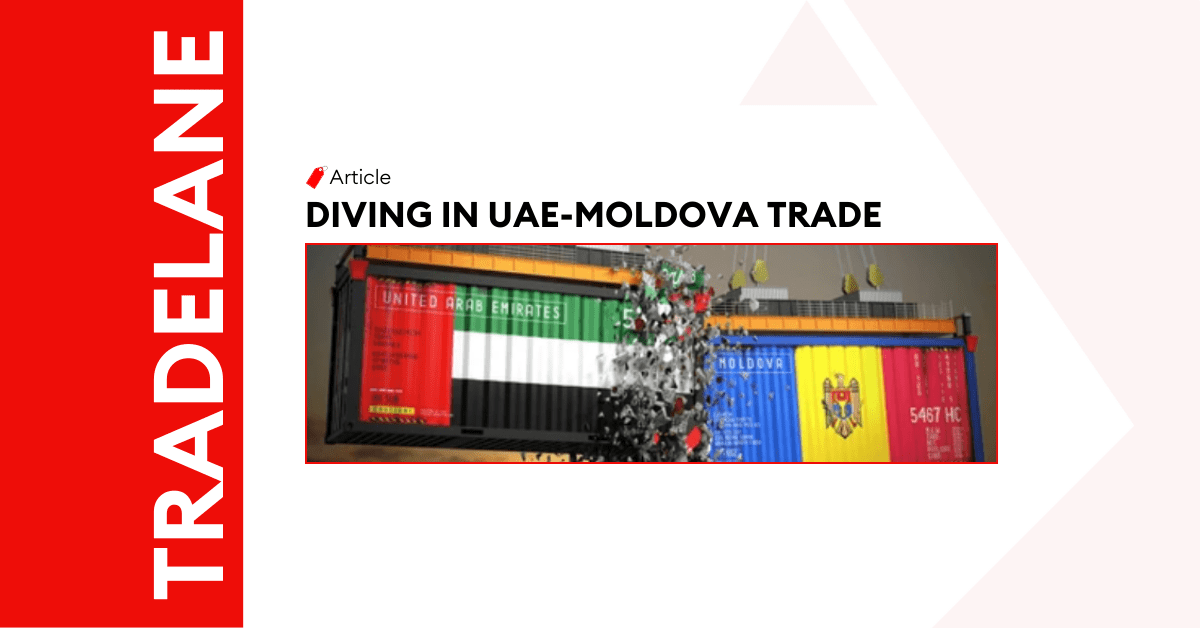
A Deep Dive into UAE-Moldova Trade Relations
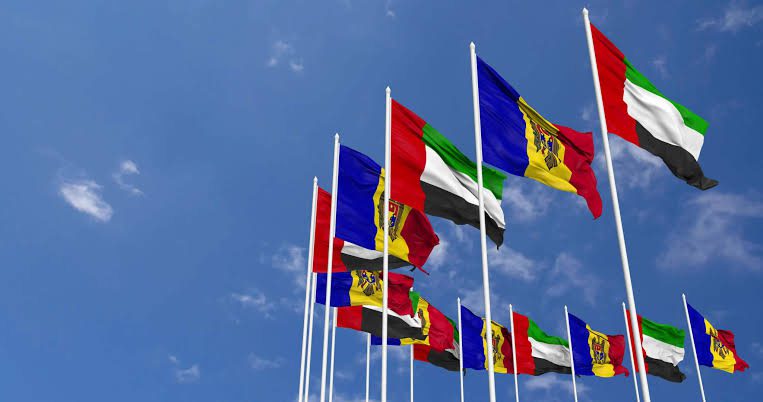
Introduction
The trade relationship between the UAE and Moldova signifies yet another economic and strategic connection between Eastern Europe and the Gulf region. Moldova, located between Romania and Ukraine, opens up the European market to the UAE, a nation eager to expand its global trade footprint beyond traditional Arab markets.
Over the past few years, Moldova has actively pursued foreign investments to boost its infrastructure, energy, and financial sectors. The UAE, known for its substantial sovereign wealth funds and dynamic private sector, is a crucial source of investment for these projects. Moreover, as both countries navigate a rapidly evolving global economy, this bilateral relationship will encourage greater cultural exchange and people-to-people connections, strengthening their mutual ties on multiple levels.
Analyzing the Economies of UAE and Moldova
The UAE Economy: Key Insights and Analysis
Top Sectors Fueling UAE’s Economic Growth
The United Arab Emirates (UAE) boasts an economic mix of oil and non-oil sectors. In 2024, the UAE economy continues to demonstrate resilience, with a projected growth rate of 5.7%. This growth reflects strong performances in non-oil aspects. The nation has strategically diversified its economy to reduce dependency on oil, with non-oil GDP now accounting for a significant portion of the its economic output.
The UAE’s economy is propelled by several key industries:
- Oil and Gas: Despite diversification efforts, the UAE still benefits from its thriving oil and gas sector, particularly in Abu Dhabi, where it forms a substantial part of the economy.
- Tourism: Tourism is a vital non-oil sector, with Dubai and Abu Dhabi serving as major global destinations.
- Aviation: Emirates and Etihad Airways are critical components of the UAE’s global connectivity, bolstering its status as a transportation hub.
- Logistics: The UAE’s advanced logistics infrastructure, including world-class ports and airports, plays a pivotal role in facilitating international trade.
Top Goods Exported by the UAE
The UAE’s top exports include
- Crude Petroleum
- Refined Petroleum
- Gold
- Broadcasting Equipment
- Natural Gas
Top Trade Allies of the UAE
The major trading partners of the United Arab Emirates include India, China, Saudi Arabia, Japan, and the United States.
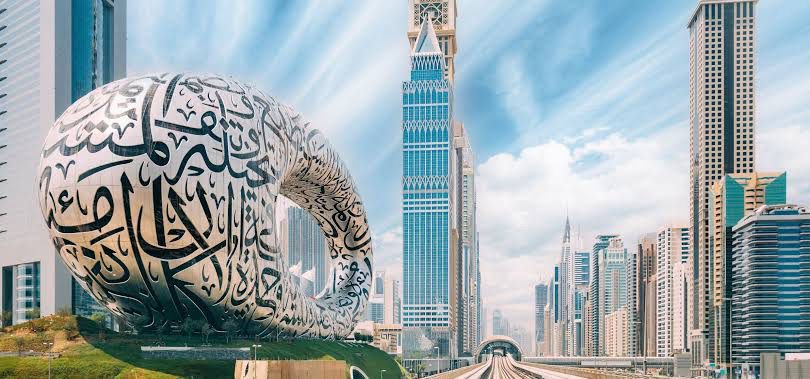
A Closer Look at Moldova’s Economic Structure
Exploring the Economic Landscape of Moldova
Moldova, a small landlocked country in Eastern Europe, has a developing economy with significant growth potential despite facing numerous challenges. As of 2024, its GDP is projected to grow by 3.5%, indicating a steady recovery from recent economic contractions due to regional instability and global economic pressures. The country’s economy is heavily reliant on agriculture, manufacturing, and remittances, with the agricultural sector particularly vulnerable to external shocks like droughts and geopolitical tensions.
With a GDP of around $16.5 billion, the nation remains one of the smallest in Europe. Despite its size, the country has shown resilience and a capacity for growth. Economic activities are primarily centered around agriculture, which constitutes a significant portion of the GDP, followed by manufacturing and services. However, Moldova’s economic landscape is also marked by significant vulnerabilities, including dependency on remittances from abroad and exposure to external economic shocks.
Why Invest in Moldova?
Moldova presents an attractive investment destination for UAE investors due to its strategic location, favorable investment climate in Free Economic Zones (FEZs), and ongoing governmental reforms aimed at improving infrastructure and business conditions.
Additionally, Moldova offers competitive labor costs and access to major European and CIS markets, making it a viable hub for manufacturing and logistics operations.
An Overview of UAE-Moldova Trade Relations
Major Industries Driving UAE-Moldova Commerce
The trade relationship between the United Arab Emirates (UAE) and Moldova is growing, driven by both nations’ efforts to diversify and strengthen their economies. The UAE, a global hub for trade and commerce, views Moldova as a strategic partner in Eastern Europe.
Moldova, with its emerging economy, seeks to attract investment from the UAE, especially in sectors such as agriculture, textiles, and energy. Significant industries involved include:
- Agriculture: Moldova exports significant amounts of agricultural products, including cereals, sunflower seeds, and wine, to the UAE.
- Energy: The UAE exports petroleum products and refined oils to Moldova.
- Textiles and Apparel: Moldova’s growing textile sector is increasingly finding markets in the UAE.
Top Exports and Imports between the UAE and Moldova
- Moldova’s Exports to the UAE: Insulated wires, sunflower seeds, and maize are among the top exported cargo from Moldova to Dubai.
- UAE’s Exports to Moldova: The UAE primarily exports petroleum products, refined oils, and electronic equipment to Moldova.
Key Shipping Routes and Transport Methods
Mapping Strategic Transport Corridors
Key Transport Corridors to Moldova
Maritime shipping to Moldova is a primary option for UAE businesses, with goods typically routed through Emirati ports before moving to Black Sea ports, and then onwards to Moldova via Romania or Ukraine. The Baltic-Black Sea-Aegean Sea Corridor is particularly significant as it connects Moldova with key EU markets for efficient transport of petroleum goods.
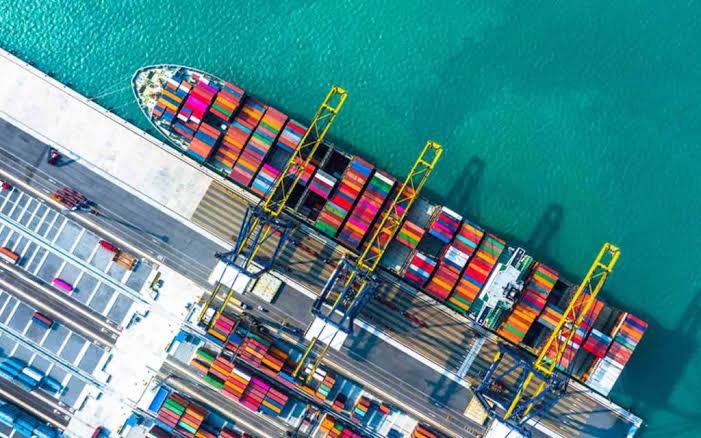
Overland routes are equally vital, especially within Europe, where the Trans-European Transport Network (TEN-T) has been extended to Moldova. This integration smoothens logistics operations and reduces transit times, making Moldova a more attractive trade partner for the UAE.
Strategic Shipping Routes Connecting the UAE and Moldova
Sea Freight Details
Sea freight forwarding services for Moldova to UAE trade are particularly vital, with most cargo traveling via container ships. Shipping from Dubai to Moldova typically involves a maritime journey through the Suez Canal, continuing into the Mediterranean, and finally reaching the Black Sea. From there, goods move by road or rail from the Port of Constanța to Moldova. The average transit time is 20-25 days, depending on the specific origin and destination ports and the type of cargo in transit.
Air Freight Details
While sea freight applies for bulk shipments, air freight is reliable in rapid delivery of sensitive items, including electronics, pharmaceuticals, perishable goods, and international car shipping services to Moldova.
The UAE’s advanced logistics infrastructure makes it an ideal point of origin for air cargo destined for Moldova. Given the relatively short distance between the two nations, air freight services can significantly reduce transit times.
Transit times for air freight to Moldova from Dubai take between 4 to 8 hours, depending on specific routes and any potential layovers.
Major Ports in UAE-Moldova Trade Lane
The UAE’s maritime infrastructure is critical to its role in global trade. The major ports involved in the UAE-Moldova trade lane include:
- Jebel Ali Port: The largest and busiest port in the Middle East handles a significant portion of the UAE’s container traffic.
- Khalifa Port: Known for its state-of-the-art facilities, this port supports the UAE’s export activities.
- Zayed Port and Port Rashid: These ports, while smaller, support specialized cruise and cargo service to Moldova.
On the Moldovan side, although landlocked, the trade typically passes through the Port of Constanța in Romania, which is well-connected to Moldova via road and rail networks.
Key Airports and Airlines
Dubai International Airport (DXB), Zayed International Airport (AUH), and Sharjah International Airport (SHJ), all in the UAE, are among the world’s busiest for cargo and passenger flights. In Moldova, Chișinău International Airport (KIV) is the primary gateway for goods entering the country by air.
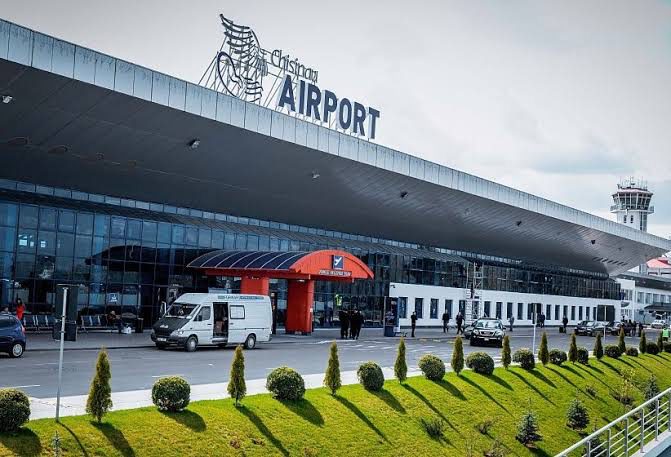
Several airlines on this route include Emirates SkyCargo, Etihad Cargo, and FlyDubai. Emirates SkyCargo, particularly, is renowned for its extensive network and efficient cargo handling.
Key Customs Rules and Regulations
Customs Rules in Moldova
Essential Requirements for Export Documentation
Navigating customs regulations is crucial for transporting cargo from Moldova to Dubai. Customs duty rates vary depending on the cargo type, while seasonal or exceptional duties may apply to protect local industries. For goods leaving Moldova for the UAE, exporters must provide several documents, including a commercial invoice, a certificate of origin, a packing list, and a customs declaration.
Import Regulations in Moldova
Importing cargo to Moldova involves adhering to specific regulations, including the payment of import duties, VAT, and, sometimes, excise taxes. The standard VAT rate is 20%, although a reduced rate of 8% applies to certain goods. Importers must also submit a customs declaration and may need to provide additional documents such as contracts, invoices, and certificates of origin.
Import Documentation and Requirements
Importers must prepare several documents to comply with Moldovan customs regulations. These typically include a customs declaration, an invoice, a certificate of origin, and any necessary permits or licenses depending on the nature of the goods being imported.
A Guide to UAE Customs Compliance
Key Documents Needed for Export
Navigating UAE customs regulations is essential for businesses engaged in international trade, particularly shipping to Moldova. The UAE’s Federal Customs Authority oversees national customs regulations, while each emirate has its customs authority managing specific procedures at airports, seaports, and land borders.
For exporting goods from the UAE, businesses must provide:
- Commercial Invoice: A detailed invoice specifying the goods being shipped.
- Certificate of Origin: This verifies the origin of the goods, essential for determining applicable tariffs.
- Packing List: Details the contents of each package, including weight and dimensions.
- Export Declaration: Required for customs clearance, confirming that all export regulations are met.
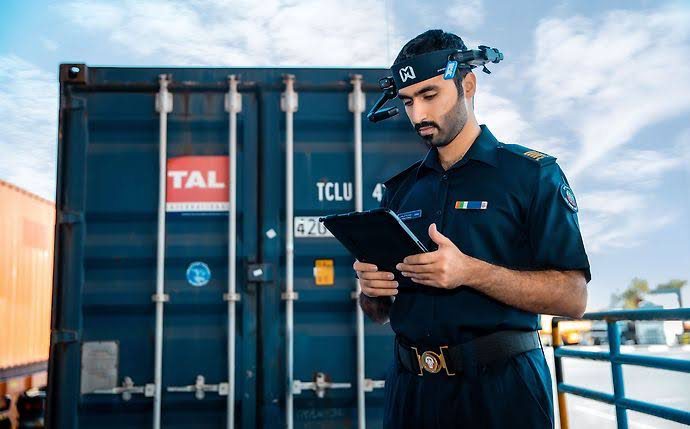
UAE Export Regulations
UAE export regulations ensure compliance with international and domestic laws. Exporting cargo to Moldova requires obtaining an export license from the local customs authority in the relevant emirate. The UAE follows strict guidelines regarding goods classification, especially for restricted items or those requiring special permits, such as technology, military equipment, and dual-use items.
UAE Import Regulations
Imports into the UAE are usually subject to a 5% customs duty, with exceptions for goods entering Free Trade Zones. Compliance with accurate goods classification is necessary, especially for restricted or prohibited items. Goods that do not comply with the UAE’s health and safety standards, or that are listed as prohibited under the GCC’s Unified Customs Law, cannot be imported.
Import Documentation and Requirements
To import goods into the UAE, businesses must provide the following documents:
- Bill of Lading (for sea freight) or Airway Bill (for air freight)
- Commercial Invoice: Detailing the goods, their value, and origin.
- Certificate of Origin: Necessary for determining applicable duties.
- Packing List: Listing the details of the shipment.
- Import Declaration: Required for customs clearance.
Navigating Trade Opportunities and Key Challenges for UAE and Moldova
Exploring Trade Opportunities
Key Industries with Growth Potential
The UAE-Moldova trade lane presents significant opportunities driven by their complementary economic structures. The Emirates offer Moldova access to broader markets in the Middle East, Africa, and Asia. Moldova, meanwhile, provides the UAE with an entry point into the European market, particularly through its Free Trade Agreements (FTAs) with the EU and other neighboring countries.
Moldova’s economy is seeing growth in sectors like agriculture, textiles, and automotive components, where the UAE can act as a strategic partner. In the UAE, industries like logistics, renewable energy, and technology are poised for growth, offering potential for Moldovan exports and partnerships.
Trade Agreements Enhancing Bilateral Trade
Moldova’s inclusion in the Deep and Comprehensive Free Trade Agreement (DCFTA) with the EU is a particularly noteworthy mention. This trade deal reduces tariffs and provides better market access for cargo service to Moldova from the UAE.
Additionally, the UAE’s involvement in multiple global trade agreements helps reduce trade barriers and enhance multilateral cooperation.
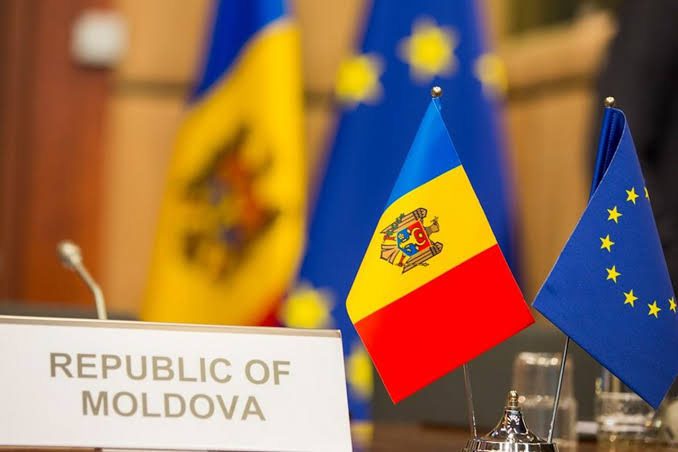
Emerging Markets in UAE-Moldova Trade
Renewable energy and data-driven technology are fast-rising sectors in the UAE, driven by the country’s Vision 2030 initiatives. In Moldova, information technology sector and renewable energy are gaining grounds, particularly as the country seeks closer alignment with EU standards and further integration into European value chains.
Addressing Trade Challenges
Language and Cultural Barriers
While English is widely spoken in the UAE, Moldovan businesses may face difficulties due to their reliance on Romanian and Russian. This language gap can lead to miscommunication, affecting negotiations, contracts, and overall business relationships. Additionally, cultural differences, such as business etiquette and decision-making processes, can further complicate trade interactions.
Political Instability
Moldova’s proximity to conflict zones, especially the ongoing tensions in Ukraine, creates uncertainty for foreign investors, including those from the UAE. This instability can lead to fluctuations in trade policies, disruptions in supply chains, and challenges in maintaining consistent trade relations. The political environment in Moldova requires careful navigation to mitigate risks and ensure the stability of trade operations.
Infrastructure Challenges
Moldova’s infrastructure, particularly in terms of transportation and logistics, is still developing and can be less reliable compared to the UAE’s advanced systems. Poor road conditions, limited rail connectivity, and inadequate warehousing facilities in Moldova can lead to delays and increased costs in trade operations. For the UAE, which prides itself on efficiency and speed, these infrastructure limitations in Moldova can be a significant bottleneck, affecting the overall competitiveness of bilateral trade.
Al Sharqi's Value-Driven Freight Services for the UAE-Moldova Trade Corridor
Al Sharqi is a leading logistics and freight forwarding company supporting smooth and efficient trade operations between the UAE and Moldova. We offer ocean and air freight, customs brokerage, warehousing, and distribution solutions, all tailored to meet unique business needs in this trade lane. By handling various cargo types, we equally supporting diverse businesses in expanding their market reach to Moldova and beyond.
Our ocean freight services include Full Container Load (FCL) and Less Than Container Load (LCL) options, ensuring flexibility and cost-efficiency for various shipment sizes. Additionally, our air freight to Moldova services provides expedited shipping solutions for time-sensitive cargo, utilizing our extensive network of airlines and air cargo carriers. These services deliver goods safely, securely, and on time, providing businesses with the reliability they need to maintain seamless operations.
Special Services for Cargo to Moldova
Our Air Cargo Charter Service to Moldova provides dedicated air freight solutions for rapid and direct delivery of goods, especially for urgent shipments or large consignments that require special handling.
Al Sharqi also offers specialized cargo services, including temperature-controlled shipping for perishable goods and secure transport for high-value items. Our expertise in customs brokerage ensures all shipments comply with regulatory requirements for fewer delays and rapid customs clearance. With our comprehensive logistics solutions, you can trust Al Sharqi to manage your cargo efficiently and effectively when shipping from Dubai to Moldova.
Get Started with Expert Logistics for Your UAE-Moldova Shipments Today!
Unlock seamless logistics solutions with Al Sharqi! As a leading logistics provider in the UAE, we specialize in efficient and reliable freight forwarding services tailored for the UAE-Moldova trade lane.
Whether you need comprehensive ocean freight, rapid air freight, or specialized cargo services, Al Sharqi has you covered. Our expert team ensures your shipments arrive on time and in perfect condition, every time. Speak with our customer service team now to learn more and get started on your next shipment.
Conclusion
The UAE-Moldova trade lane is a growing and strategically significant corridor, offering numerous opportunities for both nations. Key industries, such as agriculture, textiles, and renewable energy, hold substantial growth potential. Bilateral trade is supported by comprehensive agreements and specialized logistics services, ensuring efficient and reliable trade operations.
Looking ahead, the UAE-Moldova trade lane is poised for continued expansion. As Moldova deepens its ties with the European Union and the UAE continues to diversify its economy, the trade relationship between these two regions is expected to grow stronger, providing new opportunities for businesses in both countries.
FAQ's
In this trade exchange, Moldova exports agricultural products and textiles while the UAE primarily exports petroleum products and machinery.
–Trade agreements, such as Moldova’s DCFTA with the EU, provide reduced tariffs and better market access for businesses in Moldova-UAE trade lane.
Essential logistics services for the UAE-Moldova trade lane include ocean freight, air freight, customs brokerage, and specialized services like temperature-controlled logistics and project cargo management.
Language and cultural barriers, political instability, and underdeveloped logistics infrastructure can limit the efficiency and reliability of trade operations.
The trade relations between the two nations are positive, with greater trade volumes and deeper economic ties driven by ongoing investments, strategic partnerships, and enhanced trade agreements.
Related Articles
A Deep Dive into UAE-Moldova Trade Relations
Introduction The trade relationship between the UAE and Moldova signifies yet another economic and s
Comprehensive Analysis of UAE-Ukraine Trade Relations
Introduction The trade lane between the UAE and Ukraine has gained substantial momentum, particularl
UAE-Russia Trade Lane: Comprehensive Insights and Analysis
Introduction The trade relationship between the UAE and Russia has grown substantially through strat





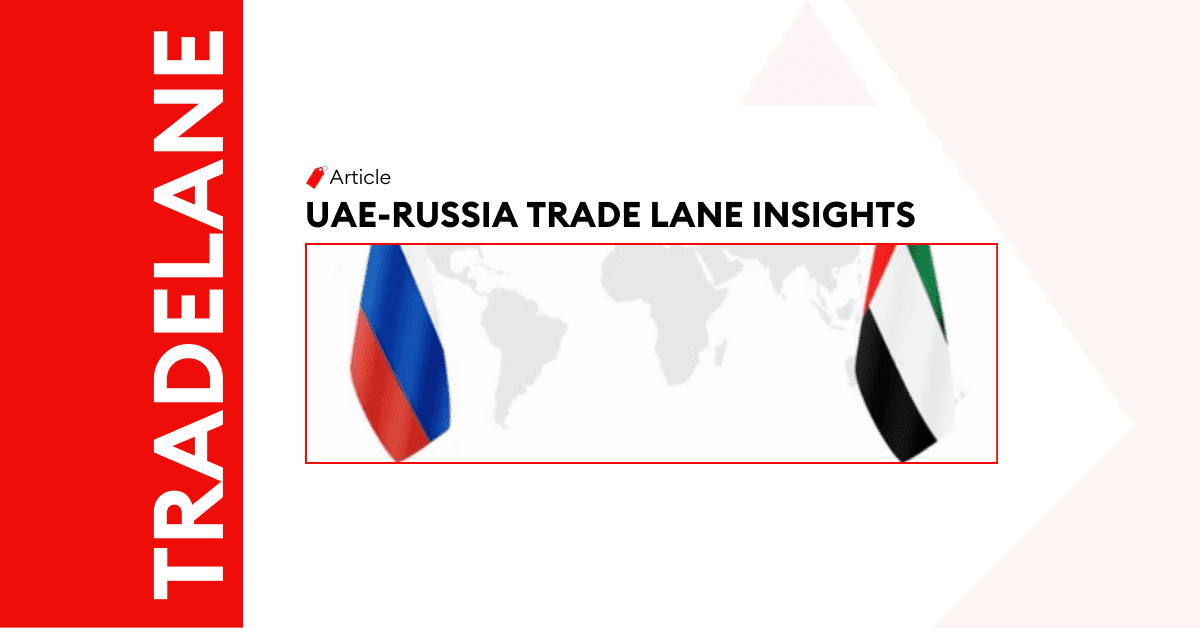
Post a comment
You must be logged in to post a comment.